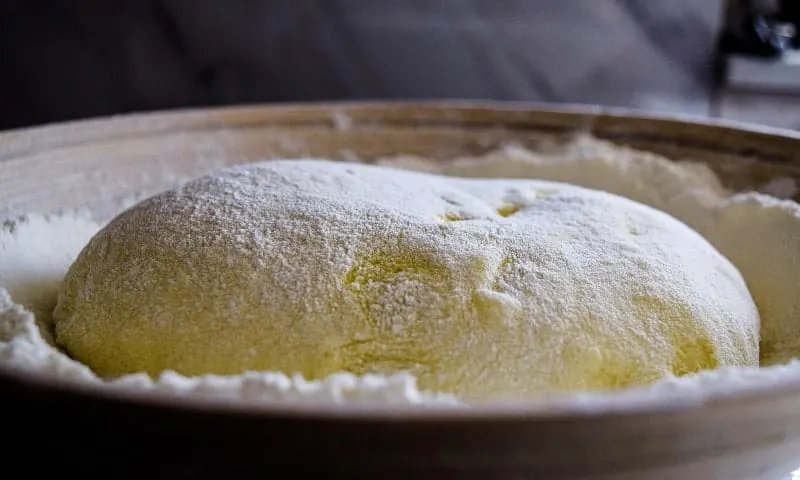There’s a time in every bread baker’s life where you end up making bread dough later in the day than you expected, so it’s getting too late to bake the dough.
When this happens, you have the option to stay up late and bake it when it’s ready, bake it whilst it’s underproofed (a big no-no), or leave it out and hope for the best in the morning.
None of these are particularly appealing, but leaving it out overnight sounds the best as you’ll be able to bake it in the morning and have fresh bread for a late breakfast or lunch.
Bread dough can be left to rise overnight if it’s stored in the refrigerator. Storing dough in the refrigerator can slow the rise for 8-48 hours or longer, depending on the dough. Some dough can be left out at room temperature overnight, but this often leads to overfermentation.
This means that you might wake up to fully proofed dough that’s ready for baking. I don’t know if there’s anything better than the smell of freshly baked bread on a morning.
If you don’t have enough space for your dough in your refrigerator, you might not have to worry as I’m going to discuss alternative ways to store your dough later in this article.
Why Refrigerating Your Dough Is Important
The most important reason that you want to refrigerate (retard) your dough is so you can prevent it from turning into a flat and overfermented mess.
When the dough overferments, or overproofs, it means that either the yeast has completely run out of their food (sugars and starches in the dough) or the dough has risen too much and collapsed.
The idea behind refrigerating the dough is that it can slow the activity of the yeast dramatically, which in turn slows their ability to consume their food and produce more gas.
If you were to leave the dough out overnight, it is almost certain to overferment, but this is significantly less likely to happen if it’s stored in the fridge.
An added bonus to this extra-long rising time is that the flavors can develop much more. The longer the dough rises and the longer the yeast gets to do their work, the better the bread is going to taste.
This is because the yeast can break down the large molecules in the dough into smaller molecules that are more complex and flavorsome, which makes it even more pleasant to eat.
The final reason to store your dough in the fridge is if it’s enriched.
Dough containing anything that can spoil easily, like eggs and milk, will easily go bad if left out for too long. You want to minimize the risk of the ingredients in the dough going bad, so you need to store it in the fridge. Leaving the dough out for too long will invite too much bacteria and can leave you with bread that may be unsafe to eat.
Another thing to consider is if your dough contains sugar. The sugar is going to feed the yeast, which causes it to produce gas more quickly and therefore overproofs faster.
Leaving Your Dough Out At Room Temperature: Is It Safe?
Almost all bread dough is going to overferment if left out unless you take the necessary actions to prevent it (more on this lower down), so it’s not wise to leave it out if you can store it somewhere colder, like in your refrigerator.
When talking about the general safety of leaving bread dough out overnight, it really depends on what ingredients are in the bread.
For lean bread that contains just flour, water, salt, and yeast (and oil), it’s going to last quite a while at room temperature. As long as none of your ingredients are contaminated with any form of bad bacteria, it’s fair to say that it will be safe to bake and eat after sitting out for a while in most cases.
It’s definitely not safe to let any enriched dough sit out for longer than a couple of hours. Since this dough often contains ingredients that can spoil quickly, it’s more likely to become a bacteria breeding ground, so you need to store it in your refrigerator if you want to keep it safe to eat.
Where Can You Leave Your Dough To Rise Overnight?
It’s very fair to say that storing your dough in your refrigerator overnight is your best option for optimal results, but not everyone has the space to fit a big bowl of dough in their fridge.
Worry not, there are other places you can leave your dough if you’re struggling for refrigerator space. These places can be effective, albeit somewhat strange, but with any luck, the dough won’t have overproofed.
- Porch/Lobby
- Cold Car
- Outhouse/Garage/Shed
- Next To A Window
The most important thing to consider is that you need a place that’s around the same temperature as your refrigerator. If you live in a warm country or it’s warm at the time of year that you’re reading this, these options may not work for you, unfortunately.
If you’re planning on storing it anywhere outside, be sure to wrap it very tightly.
Tips For Leaving Your Bread Dough Out Overnight
Whether you’re storing your dough in your fridge or just somewhere cold, you’re going to need to make sure that it’s in the best condition possible. Small mistakes are easy to make, but they can also ruin your dough and therefore ruin your bread, so here are my top tips for making sure that your dough lasts for as long as possible.
Use Less Yeast
If you’re able to plan ahead and know that you’re going to have to let your dough rise overnight, it’s wise to cut back on the amount of yeast you use.
By using less yeast, you’re slowing down the rise since less gas is being produced.
This can increase the rising time of the dough considerably, so you don’t have to worry as much about it overproofing too quickly.
Do keep in mind that the dough still needs to be stored somewhere cool. Left at room temperature, the dough is still likely to overproof even with less yeast, so your aim is to also slow the activity of the yeast by cooling it down.
Make Sure That The Dough Container Is Airtight
The last thing you want is for the surface of our dough to dry out.
Even if your dough has risen successfully overnight, the results you’ll get with a dried out surface are far from ideal. You see, when the surface dries out, it develops a leather-like texture, which makes it less elastic and can limit the rise of your bread.
When your dough is rising, you need to ensure that it’s covered very well. You want it to be airtight so no air can get in and dry it out. The drying is especially bad when the dough isn’t covered properly in the refrigerator.
You want to maintain the moisture on the surface of the dough, so you need to prevent any drying air from getting to it. This is most commonly done by wrapping the dough container tightly in plastic wrap or by using an airtight container.
Another way to prevent drying is to coat the dough in oil before covering and allowing it to rise. This oil acts as a barrier against the surface of the dough and air, so it locks in the moisture for longer.
Separate The Dough into Smaller Portions If You Can
If you’re working with a particularly large volume of dough, it may take a long time to chill down when put into your fridge or a cold place.
Since it takes so long to cool, the yeast can continue to work at their normal speed for longer, which improves the likelihood that the dough will overproof.
If you can, it’s a good idea to separate the dough so that it’s in smaller portions and therefore cools down faster.
This reduces the risk of overfermentation significantly and leaves you with easy to handle dough balls.
This isn’t ideal for everyone, and it’s not reasonable to do it on the final proof since the dough will already be shaped for baking.

